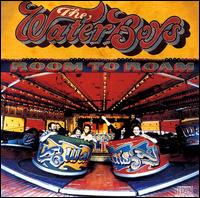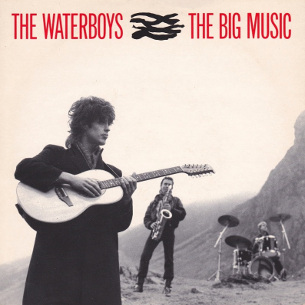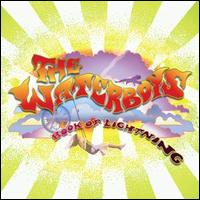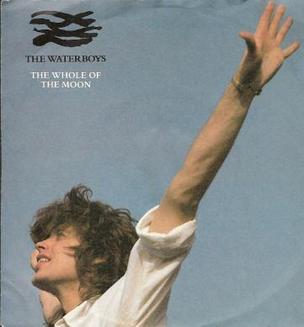
Karl Edmond De Vere Wallinger is a Welsh musician, songwriter and record producer. He is best known for leading the band World Party and for his mid-1980s stint in the Waterboys. He also wrote and originally released the song "She's the One", which was later covered by Robbie Williams and became a hit single.

The Waterboys are a British-Irish folk rock band formed in London in 1983 by Scottish musician and songwriter Mike Scott. The band's membership, past and present, has been composed mainly of musicians from Scotland, Ireland, Wales and England. Mike Scott has remained the only constant member throughout the band's career. They have explored a number of different styles, but their music is mainly a mix of folk music with rock and roll. They dissolved in 1993 when Scott departed to pursue a solo career. The group reformed in 2000, and continue to release albums and to tour worldwide. Scott emphasises a continuity between the Waterboys and his solo work, saying that "To me there's no difference between Mike Scott and the Waterboys; they both mean the same thing. They mean myself and whoever are my current travelling musical companions."

The Waterboys is the debut studio album by the Waterboys, released by Ensign Records in July 1983. The album was recorded in several studio sessions between December 1981 and November 1982. Allmusic describes the sound of the album as "part Van Morrison, part U2".

A Pagan Place is the second studio album by the Waterboys, released by Ensign Records in June 1984. It was the first Waterboys record with Karl Wallinger as part of the band and also includes Roddy Lorimer's first trumpet solo for the band on the track "A Pagan Place".

This Is the Sea is the third studio album by the Waterboys, released on 16 September 1985 by Ensign Records. The last of their "Big Music" albums, it is considered by critics to be the finest album of their early rock-oriented sound, described as "epic" and "a defining moment", and peaked at number 37 in the UK Albums Chart. Steve Wickham makes his Waterboys recording debut playing violin on 'The Pan Within' and subsequently joined the band, appearing on the video of "The Whole of the Moon". This Is the Sea is the last album with contributions from Karl Wallinger, who left the group to form his own band, World Party.

Fisherman's Blues is the fourth studio album by the Waterboys, released by Ensign Records in October 1988. The album marked a change in the band's sound, with them abandoning their earlier grandiose rock sound for a mixture of traditional Irish music, traditional Scottish music, country music, and rock and roll. Critics were divided on its release with some disappointed at the change of direction and others ranking it among the Waterboys' best work. The album was the Waterboys' best selling album, reaching a number 13 placing on the U.K. charts on release, and 76 on the Billboard 200.

Room to Roam is the fifth studio album by the Waterboys, released by Ensign Records on 2 October 1990. It continued the folk rock sound of 1988's Fisherman's Blues, but was less of a commercial success, reaching #180 on the Billboard Top 200 after its release in September 1990. Critical response continues to be mixed. Allmusic describes it both as "not quite as [musically] successful" as Fisherman's Blues, but also as a "Celtic rock classic". The front and back covers were designed by Simon Fowler based upon photography by Stefano Giovannini and Sean Jackson.

Too Close to Heaven is a collection of outtakes, alternative versions, and unreleased tracks from The Waterboys' Fisherman's Blues period, released September 2001. The album was released as Fisherman's Blues, Part 2 in the United States with five additional tracks in July of that year.

The Secret Life of the Waterboys 81–85 is an album of outtakes, live tracks, and demos, released by The Waterboys in 1994.

The Live Adventures of the Waterboys is a concert recording, released by The Waterboys in 1998. Mike Scott refers to this album as an "unofficial release" or bootleg recording, but praises the recording period as a "classic" period for the Waterboys. Most of the live songs on The Live Adventures... had already appeared on the bootlegs A Golden Day (1991) and Born To Be Together (1992). It is the only Waterboys album on which member Guy Chambers appears.

Steve Wickham is an Irish musician. Originally from Marino, Dublin, but calling Sligo home, Wickham was a founding member of In Tua Nua and played violin on the classic U2 song "Sunday Bloody Sunday", as well as recordings by Elvis Costello, the Hothouse Flowers, Sinéad O'Connor, and World Party. He is a long-standing member of The Waterboys. Wickham plays both rock and roll and traditional Irish music, and has developed a rock music technique for violin he calls the "fuzz fiddle".

"A Girl Called Johnny" is a song by British band the Waterboys, released in 1983 as the lead single from their debut studio album The Waterboys. The song was written by Mike Scott and produced by Rupert Hine. It reached No. 80 in the UK Singles Chart and remained in the Top 100 for three weeks.

"The Big Music" is a song by British band the Waterboys, released in 1984 as the lead single from their second studio album A Pagan Place. The song was written and produced by Mike Scott.

"And a Bang on the Ear" is a song from Scottish-Irish folk rock band the Waterboys, released as the second single from their fourth studio album Fisherman's Blues. It was written by Mike Scott, and produced by John Dunford and Scott. The song reached No. 1 in the Republic of Ireland and No. 51 in the United Kingdom.

Book of Lightning is the ninth studio album by the Waterboys, released on 2 April 2007 through W14/Universal Records. The album contains ten tracks, produced by Mike Scott and Philip Tennant, with musical contributions from Steve Wickham (fiddle), Richard Naiff (keyboards), Brady Blade (drums), Mark Smith (bass), Leo Abrahams, Jeremy Stacey (drums) plus long-time Waterboys alumni Roddy Lorimer (trumpet), Chris Bruce and Thighpaulsandra (keyboards). Book of Lightning was recorded in London with the exceptions of one song recorded in Vancouver with members of Canadian art-pop band Great Aunt Ida, and another in Scott's home studio.

Private Revolution is the debut album by the Welsh-British rock band World Party. At this point, singer-songwriter/multi-instrumentalist Karl Wallinger was the only member of World Party, and the only person pictured on the cover.

"The Whole of the Moon" is a song by Scottish band the Waterboys, released as a single from their album This Is the Sea in October 1985. It is a classic of the band's repertoire and has been consistently played at live shows ever since its release. Written and produced by Mike Scott, the subject of the song has inspired some speculation.
"World Party" is a song by the Scottish-Irish folk rock band The Waterboys, released in 1988 as a track on their fourth studio album Fisherman's Blues. It was written by Mike Scott, Trevor Hutchinson and Karl Wallinger, and produced by Scott. In the United States, the song reached No. 19 on Billboard Modern Rock Tracks chart and remained on the chart for six weeks. It also peaked at No. 48 on Billboard's Album Rock Tracks chart.

In a Special Place – The Piano Demos for This Is the Sea is a compilation album by Scottish-Irish folk rock band The Waterboys. It was released in 2011 by Chrysalis and Capitol (US). The album reached No. 196 in the UK Top 200 Albums Chart.


















